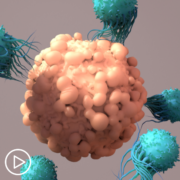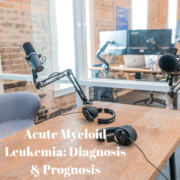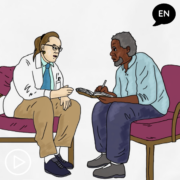Expert Advice for AML Patients When Making Treatment Choices
Expert Advice for AML Patients When Making Treatment Choices from Patient Empowerment Network on Vimeo.
What are key factors to consider for acute myeloid leukemia (AML) patients when making treatment decisions? Dr. David Sallman reviews important considerations and their impact on treatment choices, and shares questions patients should ask their doctor to receive optimal care.
Dr. David Sallman is an Assistant Member in the Department of Malignant Hematology at Moffitt Cancer Center where he specializes in myelodysplastic syndromes (MDS), acute myeloid leukemia (AML) and myeloproliferative neoplasms (MPN). Learn more about Dr. Sallman, here.
Related Resources:
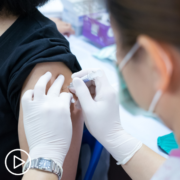
|

|
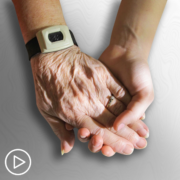
|
Transcript:
Katherine:
When making a treatment choice, what are three key considerations for AML patients?
Dr. Sallman:
Yeah, so I think the initial probably two main questions are is the patient fit or non-fit, and that’s really an evolving definition. I think historically, we had this magical age if you’re less than 60 or less than 65 years of age, but we’ve really gone past that significantly. So, does a patient have significant medical problems, decreased performance status that we would not think about intensive therapy is one of the main questions. I think what feeds into that. And the other big question is what is the underlying mutations that the patient has which really gives us a prognostic risk from a disease perspective.
With certain mutations and subgroups being much more sensitive to intensive chemotherapy and other groups really where that option is poor irrespective of age. So, I think the most important thing is how does the patient look, what is their fitness level, and what are the underlying cytogenetic and molecular changes that impact their disease.
I think third, of course, is really involving the patient in their preferences, because I think some of these can really be a decision between several options.
Katherine:
What’s the role of the patient in making treatment decisions?
Dr. Sallman:
Yeah, the patient has to be central. I’m really hoping that we’ve moved a long way from the paternalistic practices in the past.
I think there are still many instances where there’s sort of a clear best option from a medical perspective, but there’s a lot of social logistics. If you’re getting intensive therapy, as an example, you’re going to be in the hospital four to five weeks, what’s your support system? What financial, other impact factors, all of these things come into play. I think it’s a tough group. I think the patients that are, let’s say, 60 to 70, because responses are somewhat similar across non-intensive and intensive options, I think there’s the question of is the goal long-term, is the goal quality of life, and I think all of those really are impactful.
I think it can be very challenging to go through all of the specific numbers and how a patient comprehends that or not, but really trying to draw out is their goal long-term, is their goal quality of life, give them the pros and cons of the potential options in that setting, and then real-time discuss that as we go. I think when they have that buy-in from their goals, it’s important.
These are complicated regimens and patient compliance and follow-up and all that are really critical to the overall safety and good outcomes of these patients.
Katherine:
Are there questions that patients should ask in their proposed treatment plan?
Dr. Sallman:
Yeah. I think it’s always important to discuss what options. I think any time there’s a one-option, if there is a one-option, why? Maybe because standard of care in this group is so good that it’s not really reasonable to necessarily offer a main alternative regimen. I think it’s important to understand as much of the disease as possible. If you’re choosing this regimen, why are you doing it? I think asking about the mutations is important, although that’s a very complicated thing to explain. Some patients like it and some patients don’t, and I think you have to do that in your team-based relationship.
I think always asking about clinical trials is an important question to ask. Should they be getting a second opinion? These are overall very rare diseases, and we highly favor an initial consultation at an academic center that specializes in this. I’d say a majority of my patients are ultimately treated in the community. But especially given that the regimens are becoming much more complicated, the intensity of watching their counts, managing side effects, titrating medications, it’s really great to have a team-based model between academic and community centers and that can’t really ever happen if they never come to us. As much as possible for that to occur I think is important as well.


